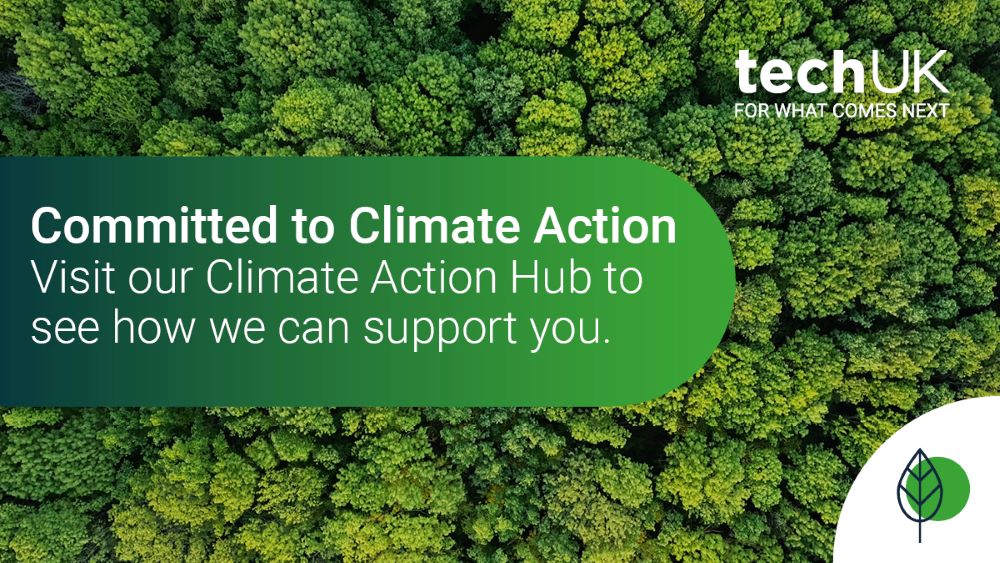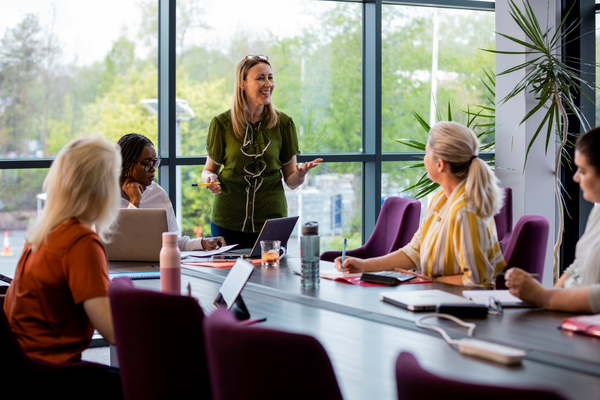Event round-up: techUK's second annual tech and net zero conference
techUK recently hosted its second annual Tech and Net Zero on 5 October. Discussion ranged from the tech sector's own net zero journey, upcoming priorities for COP28, and making the UK a climate tech leader in the face of the US IRA and EU Green Deal. Below, we summarise a few key points from a day filled with insight.
There was no shortage of conversation from our agenda. Topics included:
- What does COP 28 and the global stocktake mean for tech?
- The tech sector’s own net zero journey
- Making the UK a clean tech leader in the face of increasing scepticism, the US IRA and EU Green Deal
- Building a resilient tech ecosystem
- AI and Climate
Kicking off the day, Martina Colman, Head of Climate Science and Engineering at Climate Essentials, outlined the current climate science and devastating effects of climate change across the world. At Climate Essentials, Martina has created a platform that provides the solution for organisations and to realise their journey to decrease emissions. This marks a key opportunity for organisations from both the public and private sectors to work in collaboration to transition to a green economy and fight climate change.
Rewatch Martina Coleman's opening speech here: The latest Climate Science with Martina Colman | #TechClimateAction - YouTube
What does COP 28 and the global stocktake mean for tech?
The call to action teed up the second panel discussion on what COP28 and the global stocktake means for tech. techUK's recent article outlined more on what the tech sector can expect. This panel included industry experts, Matthew Peake, Director of Public Policy and Government Relations at Trainline, Mattie Yeta, Chief Sustainability Officer at CGI and Matthew Houlsby, Director Net-Zero Transition Practice at Madano. With COP 28 being a ‘global stocktake’ year, the panel discussed what impact the global climate talks will have for the tech sector, looking at new risks and operational issues as well as the opportunities to deliver a tech sector led decarbonisation across the economy.
Key points raised included:
- How business can show leadership in the lead up to, and at COP28, with a vital role to show how technological solutions can drive change and climate action.
- The importance of collaboration and partnership between business and government. This fosters an enabling role for the private sector and business to effectively interact and engage with COP(s).
- Following COP26 in Glasgow, there is a chance for the UK to show political leadership and convene international leaders on key climate policy challenges, including carbon pricing and resource and energy efficiency.
Watch the panel here: What does COP 28 and the global stocktake mean for tech? | #TechClimateAction - YouTube
The tech sector’s own net zero journey
Chaired by ERM's Susanne Baker, the next panel on 'the tech sector's own net zero journey' looked at how tech firms of all shapes and sizes are implementing their own net zero journeys, the problems they’ve faced, and the way they are approaching decarbonisation. Industry leaders included Abby Chicken, Head of Sustainability at Openreach, Tom Moran, Technology Strategist at Lumen, and Tim Martin, Director of Sustainability at Kyndryl.
From this panel, key points raised included:
- The cost-of-living crisis continues to impact business decarbonisation, but there is an increased imperative to reduce energy costs and usage to drive down consumer costs. The need for a just and green energy transition is vital.
- The appetite for change is large, but there is a continued need for the policy and public environment to shift the hearts and minds of people across the whole of the UK, and showcase the role of climate action in driving forward sustainable and equitable growth.
- The vital role of organisations to address their scope 3 emissions, with technological solutions, including data and apps, being a key part of the solution to this.
Watch the panel here: The tech sector’s own net zero journey | #TechClimateAction - YouTube
Making the UK a clean tech leader in the face of increasing scepticism, the US IRA and EU Green Deal
An important panel ahead of the UK General Election and led by Start Up Coalition Deputy-Director of Policy Charlie Mercer, discussion on what needs to happen for the UK to become a ‘clean tech leader’. The panel included Ben Westerman, Director of Energy and Net Zero at Henham Strategy, Lucy Yu, CEO of Centre for Net Zero and Ben Cooper, Funding and Support Lead at Tech Southwest. Discussion ranged from the role of public funding and subsidies, green finance, and creating a market for tech.
Key take home points included:
- Market signals for investment are private and public, but the government must act now to avoid being an outlier given the US IRA, perhaps the biggest moment in climate policy since the Paris Agreement.
- The UK should leverage what we are doing well, one of which is tech, with many success stories to drive down emissions and create better customer experiences. Another key success story is offshore wind, showcasing the role of clean energy and tech as an economic multiplier towards growth.
- A key focus should be on decarbonising the grid, and the role of digital technologies to do this. The recent change towards faster grid connection marked a step in the right direction from the government.
Watch the panel here: Making the UK a clean tech leader in the face of increasing scepticism | #TechClimateAction - YouTube
Building a resilient tech ecosystem
The penultimate panel on 'building a resilient tech ecosystem' looked at how the tech sector can become more resilient to climate risk, especially given that a 1.5-degree warming scenario brings numerous challenges. Discussion included how to measure and declare risk, protecting infrastructure and business critical operations, the role of insurance and contingency planning and future risk planning. Panellists involved Natalie Forrestill, Senior Cyber Security Consultant at AtkinsRéalis, George Baldwin, Head of Climate Resilience and Strategy at Marsh, Isabelle Chatel de Brancion, Business and Innovation Lead at Geovation Ordnance Survey.
From this session, key take home points included:
- New technologies, from solar energy technology to electric vehicles, all come with cyber security concerns. So, businesses must ensure security is embedded in the early design, integration and operation stages of green technology means it will not be treated as an afterthought later down the line. More on this can be found in Natalie’s recent article.
- The UNDRR’s Principles for Resilient Infrastructure marks a key development initiative for climate and ESG risks, outlining what ‘resilient infrastructure constitutes’ and how critical services such as energy, transport and water, enable the drive towards net zero.
- There must be a focus on prevention of climate risk. The geospatial ecosystem showcases innovation to address the key industry challenge and derisk infrastructure, and is already having a position impact on people and the planet.
AI and Climate
There is no doubt that AI is set to transform all sectors, and the final panel of the day, 'AI and Climate' looked at how AI is already making an impact on business decarbonisation. Chaired by David Bartram Shaw, Chief AI Officer at Mesh-AI, this panel included experts in the field. From Henry Franks, CTO at Climate Policy Radar, Simon Bennett, Director of Innovation and Incubation at AVEVA and Tarja Strahlam, Energy Transition Practice at Faculty AI.
Key take home points included:
- AI and data helps to understand the problem and how a business can reach net zero carbon emissions. In manufacturing, this could be through thermal imagery to understand rogue emissions or harmful elements of assets.
- Data plays a key role, and can bring to life the impact of AI. Particularly when data in old and new infrastrcuture is brought together.
- There is a key role for AI to play in decarbonising grid infrastructure, enabling infrastructure and assets to predict demand at a granular level. And, enabling a virtual energy network with a series of digtial twins.
- AI is not the only problem solver, and barriers to adoption still exist. The upcoming AI Safety Summit will be a key event for international governments, businesses, and stakeholders to consider the risks and opportunities of AI.
Watch the panel here: AI and Climate | #TechClimateAction - YouTube
With ever more policy and regulations impacting business climate strategies, there were roundtable breakout sessions on some of the key regulatory and policy developments impacting the tech sector. These sessions included:
- An overview of the latest climate related regulation
- Greenwashing and green claims
- Disclosure requirements for tech (SDRs, CSRD, CS3D)
Watch Mattie Yeta's breakout session here: Developing green digital skills with Mattie Yeta, CGI | #TechClimateAction - YouTube
techUK recently urged the Prime Minister to stay on course on net zero. Indeed, tech has a unique role as an enabler of economy wide decarbonisation and we know the sector is a heavy user of energy. At techUK we’re advocating for ‘tech led decarbonisation’ to reach the estimated 20% emissions reduction that can be enabled by tech, but to achieve this we need to scale the export-ready clean-tech solutions or risk losing the early mover advantage to the US and Europe. techUK urges the government to focus on tech led decarbonisation as we approach the Autumn Statement and global COP 28 climate talks.
Finally, techUK continues to advocate and disseminate our UK Tech Plan across key government stakeholders. This Plan calls for greater action from the UK government across areas of resource and energy efficiency, biodiversity, and transport infrastructure ahead of the Autumn Statement 2023 and general election. techUK also calls for the Prime Minister to stay on course on net zero policies following recent weakening of targets.
Our main takeaway from the conference was the need for climate action now, and how business and government can work together to reduce emissions and devastating environmental impacts.
techUK would like to thank CGI, our key sponsor for this year's conference.
Click the link to visit our image gallery, and revisit our conference agenda.
techUK - Committed to Climate Action
Visit our Climate Action Hub to learn more or to register for regular updates.
By 2030, digital technology can cut global emissions by 15%. Cloud computing, 5G, AI and IoT have the potential to support dramatic reductions in carbon emissions in sectors such as transport, agriculture, and manufacturing. techUK is working to foster the right policy framework and leadership so we can all play our part. For more information on how techUK can support you, please visit our Climate Action Hub and click ‘contact us’.
Climate, Environment and Sustainability updates
Sign-up to get the latest updates and opportunities from our Climate, Environment and Sustainability programme.
Upcoming climate events











